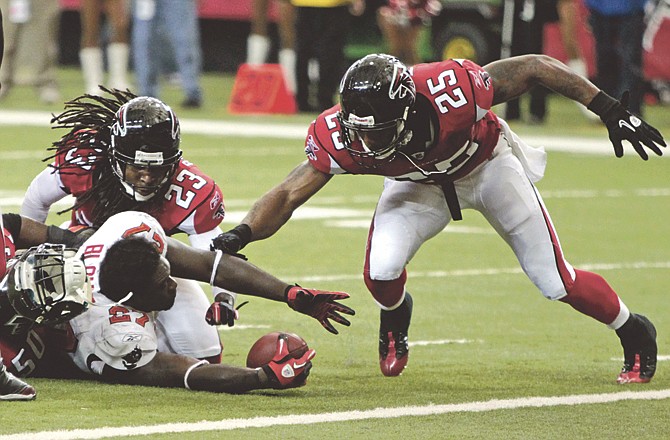ST. LOUIS (AP) - Former Missouri linebacker Aaron O'Neal never made it to the NFL. Yet his college teammate William Moore is making sure that O'Neal's legacy is not forgotten.
Moore was assigned uniform No. 24 after the Atlanta Falcons drafted the former Missouri safety in the second round in 2009. He instead chose No. 25 to honor O'Neal, a 19-year-old reserve linebacker who collapsed on the field and died during preseason workouts in 2005.
Moore, who returned to Missouri on Sunday as the Falcons defeated the St. Louis Rams 34-17 at the Edward Jones Dome, told the Columbia Missourian he thinks of O'Neal every day.
The uniform number is more than just a symbol. It's part of his identity.
On Sunday, he invited Aaron O'Neal's father Lonnie to the game. Aaron O'Neal was a St. Louis prep star who took a redshirt his first year at Missouri.
"It was good to come and play in this dome, here in this city, and knowing he (Lonnie O'Neal) was watching, it was huge," said Moore, whose late-game interception of a Sam Bradford shovel pass near the goal line helped the Falcons clinch the victory.
Moore convinced Falcons teammate Von Hutchins, who previously wore No. 25, to give up his jersey number in exchange for a $5,000 donation to the Lupus Foundation in honor of Hutchins' mother.
"That's something that's really close to him, that he takes a lot of pride in, keeping Aaron's name going," said Falcons linebacker Sean Weatherspoon, who also played at Missouri but arrived after O'Neal's death. "That's a big deal, and I'm glad he's keeping that going."
In March 2009, Missouri agreed to pay $2 million to O'Neal's parents to settle a three-year-old lawsuit. Legal documents reviewed by the Associated Press showed university officials failed to follow policies for medical emergencies at the time.
Athletic department employees also showed an unfamiliarity with potential exercise-induced complications caused by sickle cell trait despite NCAA, school and professional association requirements. O'Neal carried the inherited blood disorder that affects an estimated 8-10 percent of African-Americans.
O'Neal's official cause of death, according to the former Boone County medical examiner, was viral meningitis.
But that was later discredited, and several outside experts cited sickle cell trait. At least 13 college football players with the inherited blood disorder have died from exercise-induced trauma, according to the National Athletic Trainers Association.

